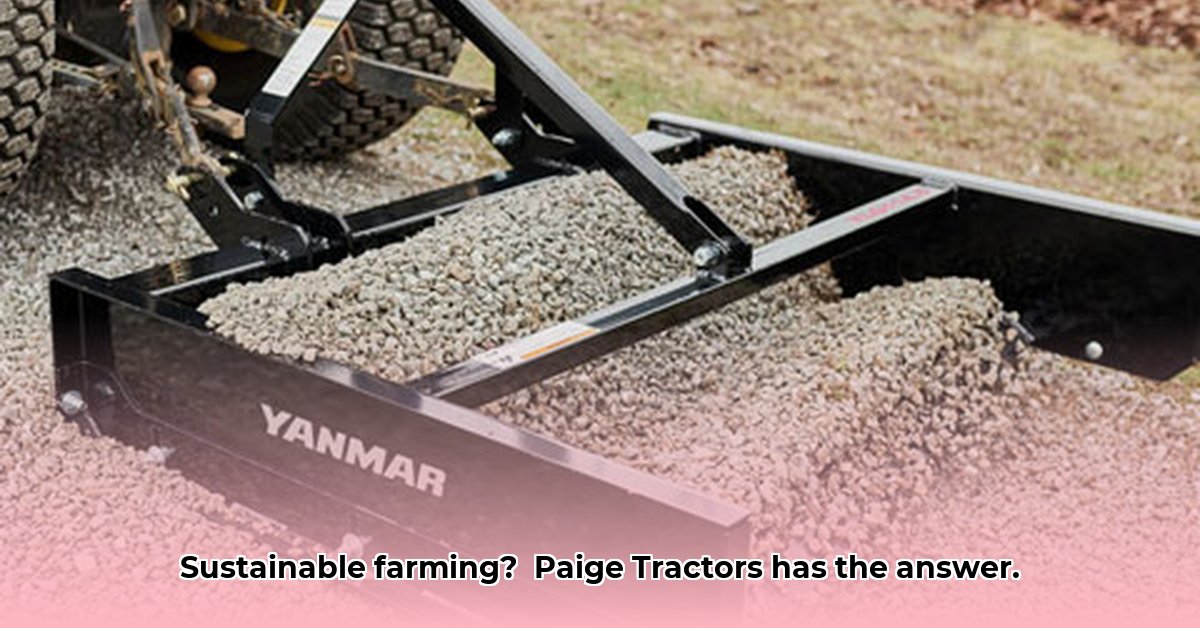
Paige Tractors Inc., located in Paige, Texas, represents a significant, albeit under-the-radar, player in the burgeoning field of sustainable agriculture. While publicly available information about the company is limited, analyzing industry trends and common practices allows us to explore its likely contributions to a greener future for farming. This article examines how Paige Tractors, through its new and used equipment offerings, supports the advancement of eco-friendly agricultural practices. Learn more about Paige Tractors here.
Modern Tractors: Efficiency and Environmental Stewardship
Modern agriculture faces the critical challenge of balancing food production with environmental responsibility. Paige Tractors' newer models likely incorporate fuel-efficient engines, reducing greenhouse gas emissions and operational costs for farmers. This simple yet impactful improvement contributes to a smaller carbon footprint and a more sustainable farming operation. Furthermore, the integration of precision farming technologies—such as GPS-guided systems—is highly probable. This allows for targeted application of fertilizers and pesticides, minimizing waste and reducing chemical runoff into vital water sources. This approach enhances both environmental protection and farm profitability.
Used Tractors: Bridging the Gap to Sustainability
The transition to sustainable agriculture requires accessible technology, and this is where Paige Tractors' used tractor inventory plays a crucial role. By offering affordable, pre-owned equipment, they make advanced farming techniques available to smaller farms and emerging farmers who may lack the capital for brand-new machinery. This democratization of technology is a vital component of widespread sustainable adoption. Providing access to reliable used equipment levels the playing field, empowering smaller farms to actively participate in environmentally conscious practices. A used tractor, in this context, becomes a pathway to a more sustainable future, promoting a broader positive impact.
Sustainable Farming Practices: A Comprehensive Approach
Effective sustainable agriculture demands a multifaceted strategy. Key practices include:
- Reduced Tillage: Minimizes soil disturbance, enhancing moisture retention and reducing erosion. This method also promotes soil health.
- Precision Agriculture: Targeted application of inputs (fertilizers, pesticides) improves efficiency and reduces environmental impact. Precise application minimizes waste and pollution.
- Water Conservation: Techniques such as drip irrigation and smart irrigation systems optimize water use. Efficient water management is essential.
- Crop Rotation: Improves soil health, reduces the need for chemical inputs, and helps control pests. Rotating crops lessens the need for fertilizers and pesticides.
The appropriate equipment facilitates the implementation of these practices. For example, no-till drills and minimum-till planters are crucial for reduced tillage, while GPS-guided tractors and sensor-based sprayers are essential for precision agriculture.
Paige Tractors and the Future of Sustainable Farming
Paige Tractors, while maintaining a relatively low public profile, likely contributes significantly to sustainable agriculture through its equipment provision. Potential future developments could include integrating advanced technologies such as autonomous tractors and sophisticated data analytics to further enhance efficiency and environmental responsibility. Collaborations with agricultural colleges or non-profits to provide training on sustainable farming practices would amplify their impact. Their role in supporting farmers' adoption of environmentally friendly techniques positions them as a key player in creating a more resilient and sustainable agricultural system.
How to Implement Affordable Precision Farming for Smallholder Farmers
Key Takeaways:
- Precision agriculture significantly boosts yields while decreasing input costs.
- Affordable technologies are making precision farming increasingly accessible.
- Smart strategies are crucial for successful implementation.
- Collaboration and support are vital for widespread adoption.
Paige Tractors’ potential role in supporting affordable precision farming for smallholder farmers is significant. This is achieved through providing both new and used equipment, lowering the barrier to entry for these farmers.
Essential Steps:
- Assess Needs: Identify specific needs and challenges related to resource management and current farming practices.
- Prioritize Technology: Focus on cost-effective technologies that address immediate needs and provide the greatest impact.
- Embrace Training and Support: Utilize available resources such as government programs, workshops, and farmer cooperatives. This fosters knowledge sharing and collaborative problem-solving.
- Monitor and Adapt: Continuously evaluate the impact of implemented strategies. This allows for refinements and adaptations based on real-time data and feedback .
The future of sustainable agriculture hinges on technological advancements and collaborative efforts. Paige Tractors, by offering accessible equipment and indirectly supporting sustainable practices, occupies a pivotal position in this evolving landscape.